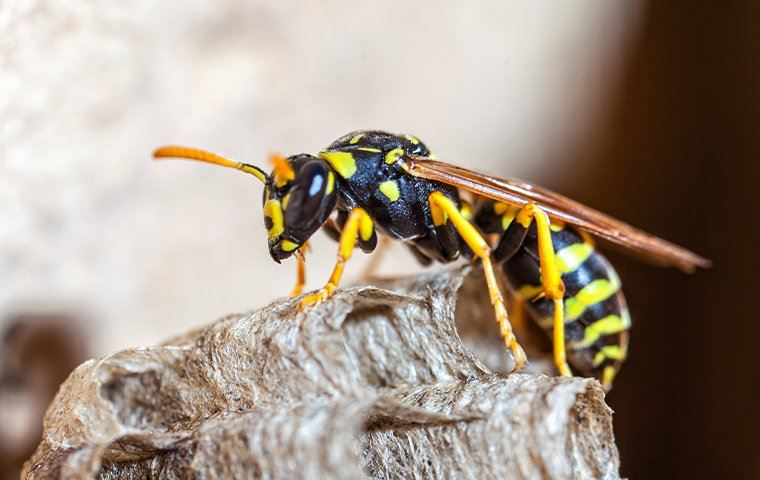
Stinging Insects

What are stinging insects?
Stinging insects are dangerous pests that we try to avoid contact with at all costs. While helpful to the ecosystem, they can create many problems for people and our properties when they decided to call our yards home.
Stinging insects vary by species, but all have a stinger extending from their hind end they use for defense and, in predatory species, to paralyze prey.
The most common species of stinging insects in Northeast Ohio with include:
- Honey bees
- Wasps
- Hornets
- Yellow jackets
- Carpenter bees
Our Stinging Insect FAQs
Have questions? We are here to help. Still have questions or can't find the answer you need? Give us a call at 330-278-8939 today!
-
Are stinging insects dangerous?
Though highly beneficial when living outside away from people, the negatives associated with stinging insects, more often than not, outweigh their benefits when they decide to nest in our yards or use our properties as a foraging site.
To those that are allergic to stinging insect venom, the presence of stinging insects around your property can be a serious problem. Depending on the severity of the allergy, being stung can cause localized swelling or lead to life-threatening reactions. Besides, whether you are allergic or not, having to dodge bees and wasps whenever you are trying to spend time in your backyard is not something anyone should have to deal with. Being stung by a stinging insect is a painful experience and can lead to a secondary infection.
Sometimes stinging insects also cause structural damage. When honey bees decide to nest in a home’s wall voids, the honey left behind will attract other insects and lead to mold issues. Carpenter bees cause even more problems by creating nests inside wood and damaging wood trim, shingles, fences, play structures, furniture, and more.
-
Why do I have a stinging insect problem?
Stopping stinging insects from nesting on your property is tricky. These pests live and breed primarily outdoors and will fly into any area that offers them food, water, and shelter.
- Food: Stinging insects will gather food from flowerbeds, gardens, flowering trees, trash cans, and outdoor eating areas.
- Water: Containers that collect rainwater, clogged gutters, birdbaths, and even overwatered gardens and lawns provide stinging insects with water sources.
- Shelter: Stinging insects will build nests in various places in our yards and on our homes.
-
Where will I find stinging insects?
The following outdoor habitats are where stinging insects often live in large numbers:
- Orchards
- Gardens
- Woodlands
- Yards
Some of their favorite spots to build nests in our yards include trees or utility poles, shrubs or bushes, ground holes, woodpiles, or piles of construction debris.
In or on our homes, stinging insects will build nests on decks or porches, behind shingles or shutters, and in doorways or the corners of windows.
If stinging insects exploit an opening in your home to build a nest in a sheltered spot, the nests typically wind up in wall voids, crawl spaces, or chimneys.
-
How do I get rid of stinging insects?Take back your home from stinging insects with the help of the professionals at Epcon Lane. For over 75 years, we have been working diligently to protect Northeast Ohio properties from our area’s most common pests. Our professionals use eco-friendly products and specialize in Integrated Pest Management to eliminate stinging insects in Akron, OH and stop their return. Protecting people and the environment are our top priorities. To get peace of mind and maintain a property free of these stinging pests, trust the Epcon Lane professionals! Learn more about our pest control packages by giving us a call today!
-
How can I prevent stinging insects in the future?
Eliminate stinging insects and take back your home with the help of Epcon Lane and by implementing the following prevention tips.
- Keep stinging insects out of your home by sealing spaces in exterior walls, placing caps on chimneys, and covering vents.
- Stop stinging insects from swarming around outdoor eating areas by keeping food and drinks covered and bringing leftover food quickly back indoors after you finish eating.
- Remove water sources by keeping gutters clear, storing containers upside down, and filling in low-lying areas that allow puddles to develop.
- Keep your yard free of tall grass, overgrown landscaping, and excess piles of wood, rocks, or construction debris where they could build a nest.
- Fill in ground holes that develop in your yard.
Learn more about our home pest control and commercial pest control solutions